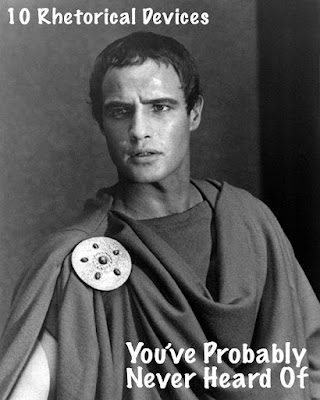Shakespeare is famous for many of his soliloquies––a word difficult to spell, but a concept simple to understand.
Soliloquy comes from a Latin compound word, soliloquium. The first part of the compound word, soli, means alone. The second part of the compound word is derived from the verb loqui, which means speak. So the word soliloquy essentially means "speak alone."
What's a soliloquy?
A soliloquy is a speech given when a character is alone or regardless of any hearers. A character may deliver a soliloquy to try to figure something out, or to reach beyond the fourth wall to tell the audience something in confidence.
Example: Macbeth's soliloquy from Act II, Scene 1 of Macbeth
Is this a dagger which I see before me,
The handle toward my hand? Come, let me clutch thee!
I have thee not, and yet I see thee still.
Art thou not, fatal vision, sensible
To feeling as to sight? or art thou but
A dagger of the mind, a false creation
Proceeding from the heat-oppressèd brain?
I see thee yet, in form as palpable
As this which now I draw.
Thou marshall'st me the way that I was going,
And such an instrument I was to use.
Mine eyes are made the fools o' th' other senses,
Or else worth all the rest. I see thee still,
And on thy blade and dudgeon gouts of blood,
Which was not so before. There's no such thing.
It is the bloody business which informs
Thus to mine eyes. Now o'er the one half-world
Nature seems dead, and wicked dreams abuse
The curtained sleep. Witchcraft celebrates
Pale Hecate's offerings; and withered Murder,
Alarumed by his sentinel, the wolf,
Whose howl's his watch, thus with his stealthy pace,
With Tarquin's ravishing strides, towards his design
Moves like a ghost. Thou sure and firm-set earth,
Hear not my steps which way they walk, for fear
Thy very stones prate of my whereabout
And take the present horror from the time,
Which now suits with it. Whiles I threat, he lives;
Words to the heat of deeds too cold breath gives.
A bell rings.
I go, and it is done. The bell invites me.
Hear it not, Duncan, for it is a knell
That summons thee to heave, or to hell.
Why This Speech is a Soliloquy
This speech is commonly accepted as a soliloquy. In the blue-colored sections of the soliloquy, Macbeth traditionally addresses himself, though he could also be addressing the audience.
In the purple-colored sections of the soliloquy, Macbeth addresses three different audiences. However, the speech remains a soliloquy because none of the audiences can hear, understand, or answer him.
In the first purple-colored section, Macbeth addresses the dagger itself, referring to it as "thee" and "thou." Because a dagger is an inanimate object (and, in this case, an imaginary one), Macbeth is still alone on stage. In the second purple-colored section, Macbeth addresses the "sure and firm-set earth." The ground is as inanimate as the dagger, so Macbeth is essentially still speaking to himself or the audience.
In the third and final purple-colored section, Macbeth addresses King Duncan, who is still alive at this point. However, it is the middle of the night and Duncan is asleep. Therefore, he cannot hear, understand, or answer Macbeth.
What's the difference between a soliloquy and a monologue?
The difference is the intended audience. In a soliloquy, a character is either speaking to himself or to the audience. In a monologue, one character is speaking to another character.
Example: Luciana's monologue from Act III, Scene 2 of The Comedy of Errors
And may it be that you have quite forgot
A husband's office? Shall, Antipholus,
Even in the spring of love, thy love-springs rot?
Shall love in building grow so ruinous?
If you did wed my sister for her wealth,
Then for her wealth's sake use her with more kindness;
Or if you like elsewhere, do it by stealth,
Muffle your false love with some show of blindness.
Let not my sister read it in your eye;
Be not thy tongue thy own shame's orator;
Look sweet, speak fair, become disloyalty;
Apparel vice like virtue's harbinger;
Bear a fair presence, though your heart be tainted;
Teach sin the carriage of a holy saint,
Be secret false; what needs she be acquainted?
What simple thief brags of his own attaint?
'Tis double wrong to truant with your bed,
And let her read it in thy looks at board;
Shame hath a bastard fame, well managed;
Ill deeds is doubled with an evil word.
Alas, poor women, make us but believe
(Being compact of credit) that you love us;
Though others have the arm, show us the sleeve;
We in your motion turn, and you may move us.
Then, gentle brother, get you in again;
Comfort my sister, cheer her, call her wife;
'Tis holy sport to be a little vain
When the sweet breath of flattery conquers strife.
Why This Speech is Not a Soliloquy
Though not as long as Macbeth's soliloquy (which is particularly long), this speech is just about the right length for a soliloquy. So how come it is not a soliloquy, but a monologue?
The difference lies in the intended audience. Luciana is speaking to Antipholus of Syracuse, who is onstage with her. They enter together at the beginning of the scene, and Luciana addresses him throughout her speech in the second person.
What's the difference between a soliloquy and an aside?
The difference is the length of the speech. An aside is a short, quick interjection to the audience. A soliloquy is much longer.
Example: Olivia's aside in Act III, Scene 4 of Twelfth Night
[aside] I have sent after him, he says he'll come:
How shall I feast him? What bestow of him?
For youth is bought more oft than begg'd or borrow'd.
I speak too loud. –
Where's Malvolio? He is sad and civil,
And suits well for a servant with my fortunes:
Where is Malvolio?
Why This Speech is Not a Soliloquy
This speech is not a soliloquy because it is not long enough. It is noticeably short––a mere 7 lines long (whereas Macbeth's soliloquy was 33 lines long).
As a helpful hint, most editions print the word "[aside]" in the text before lines commonly recognized as asides. However, an actor can make the choice to deliver some lines of text as asides, even if they are not marked in the script with the word "[aside]."




Comments
Post a Comment
All comments are moderated by the Green-Eyed Blogger to avoid spam. If you do not see your comment right away, do not worry; it is simply undergoing our routine moderation process.